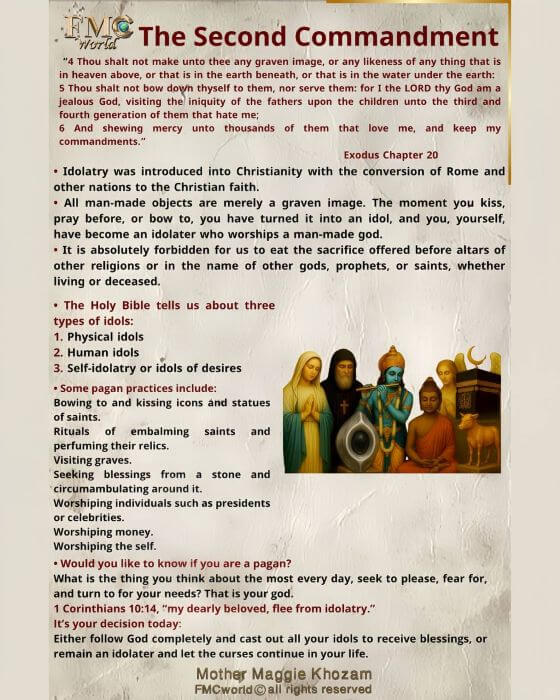

As a Christian, have you ever asked yourself:
Why have I never heard a sermon from any priest regarding the Second Commandment of the Ten Commandments?
You will find the answer here.
Exodus Chapter 20: “4 Thou shalt not make unto thee any graven image, or any likeness of any thing that is in heaven above, or that is in the earth beneath, or that is in the water under the earth:
5 Thou shalt not bow down thyself to them, nor serve them: for I the LORD thy God am a jealous God, visiting the iniquity of the fathers upon the children unto the third and fourth generation of them that hate me;
6 And shewing mercy unto thousands of them that love me, and keep my commandments.”
And He affirms it in Leviticus 19:4, “Turn ye not unto idols, nor make to yourselves molten gods: I am the LORD your God.”
Since Adam, and for over ten thousand years, humanity has not been able to worship without having something to pray before, they need something tangible and visible.
The Holy Bible tells us about three types of idols:
1. Physical idols
2. Human idols
3. Self-idolatry or idols of desires
In the First Book of Samuel, we see what happened to the Philistines who worshiped Dagon, a carved god with hands and a fish tail, when they tried to place it alongside the Ark of the Covenant. A terrible calamity befell both them and their god. As we see in the Book of Numbers, when the Israelites joined themselves to Baalpeor, a plague struck them, resulting in the deaths of over twenty-four thousand of them. Therefore, we find that the LORD’s prophets throughout the Holy Bible, and even Christ’s disciples and apostles in the New Testament, were often persecuted for forbidding people from worshiping other gods and for opposing idolatry.
Liturgical Christians may think that kneeling before icons or statues of saints and kissing them is an act of honor, not worship, and that it is veneration, not idolatry. But allow me to shock you: you are mistaken. Anything made by human hands or manufactured in factories is nothing more than a graven image. The moment you pray before it, kneel to it, or kiss it, you have turned it into an idol. Once you surrender your life to it and begin praying to it to fulfill your requests, you have become an idolater who worships a man-made god, carries it with you wherever you go, and cleans it whenever it becomes dirty.
Some may argue that the commandment only forbids making statues of animals or beasts, and that creating images of Christ, the Virgin Mary, or the saints is a different matter. But the Holy Bible responds directly in Deuteronomy 4:16 “Lest ye corrupt yourselves, and make you a graven image, the similitude of any figure, the likeness of male or female.” This shatters any defense of idolatry hidden behind the sanctification of saints through bowing to statues and icons.
Let us pay attention to what the Holy Bible warns us against regarding breaking this commandment, as stated in Exodus 20:5, “visiting the iniquity of the fathers upon the children unto the third and fourth generation of them that hate me”
Upon Rome’s adoption of the Christian religion, idolatry was incorporated into Christianity, as they preserved their Roman idols and the practice of bowing. However, Satan merely altered their names. In other words, they transferred the names “Zeus,” “Isus,” and “Isis” to Saint “George,” “Elias,” and “Elian.” And so, generation after generation, Christians inherited the practice of bowing and praying to idols without realizing it. Consequently, they endure afflictions similar to those of idolaters, without understanding the cause, because the LORD God sees this as worship of other gods, not as honor to His saints.
Allow me to go even further: the verse that traditional church priests often quote, “Praise God in His saints,” is a distortion of the true biblical text, intended to mislead the congregation away from true worship. The Holy Bible clearly states in Psalm 150:1, “Praise God in his sanctuary:” not in His saints.
Furthermore, the LORD God equates idolaters with adulterers and “abusers of themselves with mankind,” as we read in 1 Corinthians 6 “9 Know ye not that the unrighteous shall not inherit the kingdom of God? Be not deceived: neither fornicators, nor idolaters, nor adulterers, nor effeminate, nor abusers of themselves with mankind,
10 Nor thieves, nor covetous, nor drunkards, nor revilers, nor extortioners, shall inherit the kingdom of God.”
Even the rituals of embalming saints, perfuming their remains from time to time, or exhuming their bodies under the pretext of veneration are practices that are frowned upon in Christianity. In fact, the LORD prohibited us from visiting graves, and He forbade priests from touching the bodies of the dead, as stated in (Leviticus 21). Also, in the Gospel according to Luke 9:60, He said: “Let the dead bury their dead”
The LORD Jesus visited only one tomb, that of Lazarus, to call him: “Lazarus, come forth.” That is, to raise him from the dead, rather than anointing his body, as the churches boast of possessing saints’ relics. They even go so far as to preserve and prostrate to saints’ fingers or remaining body parts, similar to pagan practices. If these rituals were truly Christian, we would have seen them mentioned at least once in the Holy Bible, which records in detail the early Church’s life. For example, even Paul’s cloak is noted in 2 Timothy 4:13, “The cloke that I left at Troas with Carpus, when thou comest, bring with thee”
Had any of these items held spiritual significance, the early Church would have preserved Paul’s cloak or bonnets, or a piece of Peter’s bones. Elisabeth would have mentioned the Virgin Mary’s belt, or the disciples would have retained Christ’s burial shroud or a part of the cross’s wood.
In fact, these practices are detestable and religiously rejected. Idolatry and heresy have infiltrated churches to the extent that people even kiss snakes, as happens in some churches in Greece, where they believe that the Virgin Mary sends small snakes, which they then place on their children’s heads and kiss.
Of course, I cannot mention all the pagan practices found in all other religions, as that would require a book, not just an article, from seeking blessings from a stone and circumambulating it, to drinking camel urine and seeking blessings from it, and so on. Nor will I delve into the worship of people like leaders and celebrities, or even the worship of money and the self, all of which fall under one broad name: idolatry.
Do you want to know if you are a pagan? Set a measure for yourself, and observe yourself for just one day. What is the thing you think about the most? What is the thing you strive to please? What is the thing you fear for the most? What is the thing you clean, polish, stand before, and care for? What is the thing you ask for, if you were to stand before it? That is your god.
In the end, the door of repentance is still open. Throw out your statues, your images, and everything made by human hands that you pray to, for these are not your intercessors. As a Christian, you have one intercessor whose intercession never fails, as it is written in Romans 8:26 “but the Spirit itself maketh intercession for us with groanings which cannot be uttered.” You don’t need the intercession of the deceased, nor to bow before man-made objects. Don’t be afraid to cast your statues and icons out of your life. Don’t think they hold any value before God, or that He will hold you accountable for discarding them. Moses broke the tablets of the Law, which were written by the very finger of the LORD God, out of anger when he saw the Israelites worshiping a man-made calf (Exodus 32:19). Did the LORD God punish Moses for that? Did He say something like: “You have mocked what My hands have made”? From this, we learn that man-made and hand-crafted objects hold no value to the LORD God, even if they were made by His own hand and written by His own finger.
We must be cautious about sacrifices offered to idols. Those who bow to idols also offer sacrifices to them, and we are strictly forbidden from eating any sacrifice offered at altars other than God’s, whether it is for saints, the deceased, or even for other religions and gods. The Apostle Paul says in 1 Corinthians 10, “20 But I say, that the things which the Gentiles sacrifice, they sacrifice to devils, and not to God…
21 Ye cannot drink the cup of the LORD, and the cup of devils:”
The LORD God clearly says in 1 Corinthians 10:14, “my dearly beloved, flee from idolatry.”
August / 18 / 2020